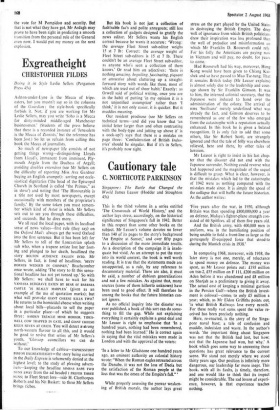Singapore : The Battle that Changed the World James Leasor
(Hodder and Stoughton 45s)
Cautionary tale
C. NORTHCOTE PARKINSON
This is the third volume in a series entitled `The Crossroads of World History,' and the author lays stress, accordingly, on the historical significance of Singapore's fall in 1942. Better in this respect than some other books on the subject. Mr Leasor's volume devotes no fewer than 140 of its pages to the story's background 'An Empire at Sunset,' and over fifty pages to a discussion of the more immediate results. As a description of the campaign it is inade- quate but vivid. As an attempt to put the story into its world context, the book is well worth reading. It is true that the statements made are unsupported, as a rule, by any reference to documentary material. There are also, it must be said, a number of dubious generalisations and not a few mistakes. As against that, many sources (some of them hithertO unknown) have been used to good effect.' It will therefore be among the books that the futire historian can- not ignore.
As no official inquiry into the disaster was ever published, a book of this sort can do some- thing to fill the gap. While not explaining everything it certainly explains a great deal and Mr Leasor is right to emphasise that 'In a hundred years, nothing had been remembered, nothing had been learned.' He is correct again in saying that the vital mistakes were made in London and with the approval of the voters: 'In a letter to Mr Gladstone one hundred years ago, an eminent authority on colonial history wrote: "When the Roman eagles retreated across the Danube, it was not the loss of Dacia but the satisfaction of the Roman people at the loss that was the omen of the Empire's fall."' While properly assessing the prewar weaken- ing of British morale, the author lays great stress on the part played by the United States in destroying the British Empire. The deep well of ignorance from which British politicians drew their inspiration was less profound than the well of prejudice and misinformation on which Mr Franklin D. Roosevelt could rely. For his folly the Americans are paying now in Vietnam and will pay, no doubt, for years to come.
Had Roosevelt had his way, moreover, Hong Kong would have been given to Chiang Kai- shek and so have passed to Mao Tse-tung. That it remains British today (Mr Leasor explains) is almost solely due to the leadership and cour- age shown by Sir Franklin Gimson. It was to him, the interned colonial secretary, that the Japanese were induced to hand over the administration of the colony. The arrival of HMS `Swiftsure' merely underlined what was already the fact, and Gimson deserves to be remembered as one of the few who emerged from the catastrophe with a reputation actually enhanced. In this book he is given a belated recognition. It is only fair to add that some others, like Sir Robert Scott, are strangely ignored and that the tale of folly was elsewhere relieved, here and there, by other tales of heroism.
Mr Leasor is right to insist in his last chap- ter that the disaster did not end with the Japanese surrender. Nothing could reverse what had happened and the magnitude of the sequel is difficult to grasp. What is clear, however, is that the mistakes which led to the catastrophe of 1942 were as nothing compared with the mistakes made since. It is simply the speed of the collapse that will baffle the future historian. As the author writes: 'Five years after the war, in 1950, -although Britain was then spending £800,000,000 a year on defence, Malaya's fighter-plane strength con- sisted of 60 Spitfires, all of them five years old.
And the British army, with 400,000 men in uniform, was in the humiliating position of being unable to field a front-line as large as the grotesquely ill-equipped force that stood-to during the Munich crisis in 1938.'
In comparing 1968, moreover, with 1938, the later story is not one, merely, of reluctance to spend money on defence. The money was spent, as Mr Leasor points out: £195 million on Tsn-2, £55 million on F 111, £200 million on Aden before it was abandoned and £8 million on Sharjah as a preliminary to giving it away. The actual cost of keeping a minimal garrison in the Persian Gulf—where the British invest- ment is colossal—comes to only £5 million a year; which, as Mr Eldon Griffiths points out, `is what British Railways lose every month.' For these really vast sums spent the value re- ceived has been precisely nothing.
Here, re-enacted, is the story of the Singa- pore naval base; a tale of confusion and muddle, indecision and waste. In the author's words 'the important thing about Singapore was not that the British had lost, but how; not that the Japanese had won, but why.' A book which goes some way to answering these questions has great relevance to the current scene. We stand not merely where we stood thirty years ago. Our position is infinitely more dangerous, our leadership far more inept. This book, with all its faults, is timely, therefore, and one would like to think that its impact might be considerable. The sad lesson of experi- ence, however, is that experience teaches nothing.






































 Previous page
Previous page